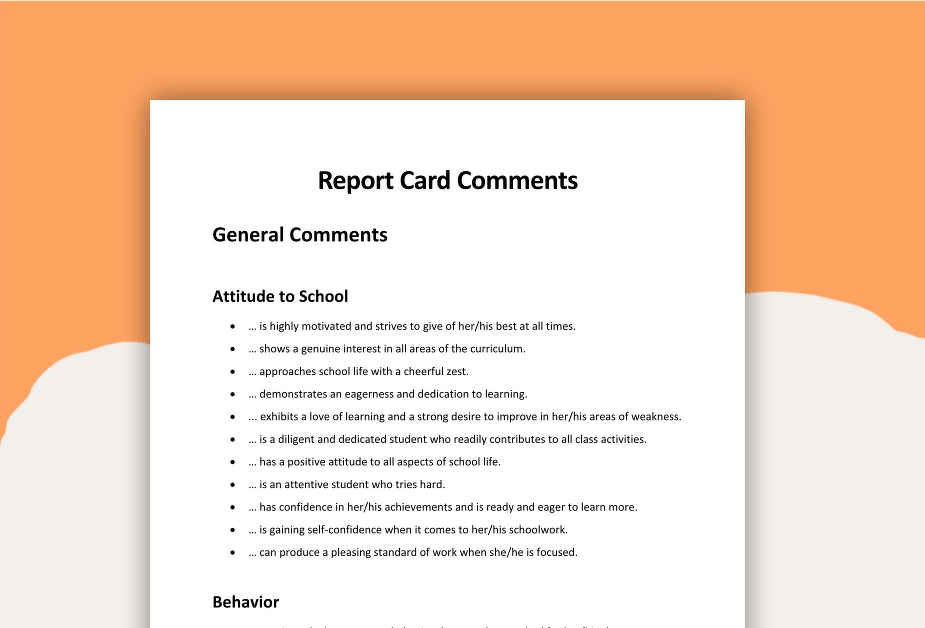Giving students constructive criticism is one of the most important tasks a teacher faces. It can be difficult to know how to best communicate with a student about their progress, especially when it comes to report card comments. This guide will help you write effective report card comments that are clear, concise, and accurate. So let’s get started!
Math & ELA | PreK To Grade 5
Kids see fun.
You see real learning outcomes.
Watch your kids fall in love with math & reading through our scientifically designed curriculum.
Parents, try for free Teachers, use for free
What Makes a Good Report Card Comment?
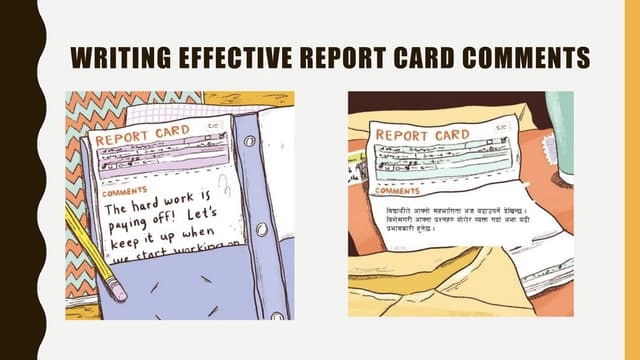
There are a few key things to keep in mind when writing report card comments. Here is what makes a good report card comment:
1. Positive and Solution-Focused
It’s important to focus on the positive when writing report card comments. For every negative comment, there should be at least two positive comments. This report card comment strategy is a great way to make sure you’re including both positive and negative feedback in your comments.
2. Clear and Concise
A good report card comment Report card comments should be clear and concise. This means avoiding generalities and using specific, concrete examples. This will help the student (and their parents) understand what they need to work on.
3. Accurate
Report card comments should be accurate. This means making sure your comments align with the grades the student has earned. There’s no point in sugar-coating a bad grade – it will only confuse the student and their parents.
Now that we’ve gone over what makes a good report card comment, let’s look at some tips for writing effective report card comments.
76 Report Card Comments Examples
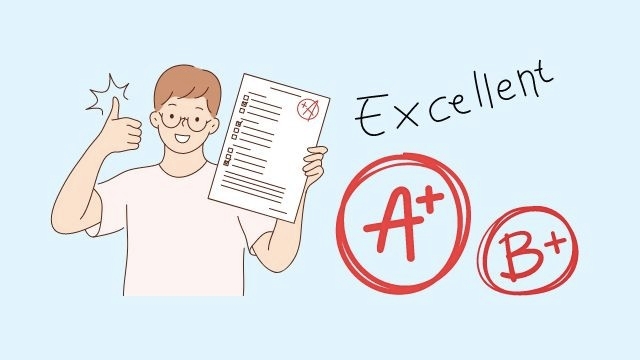
11 Academic Achievement
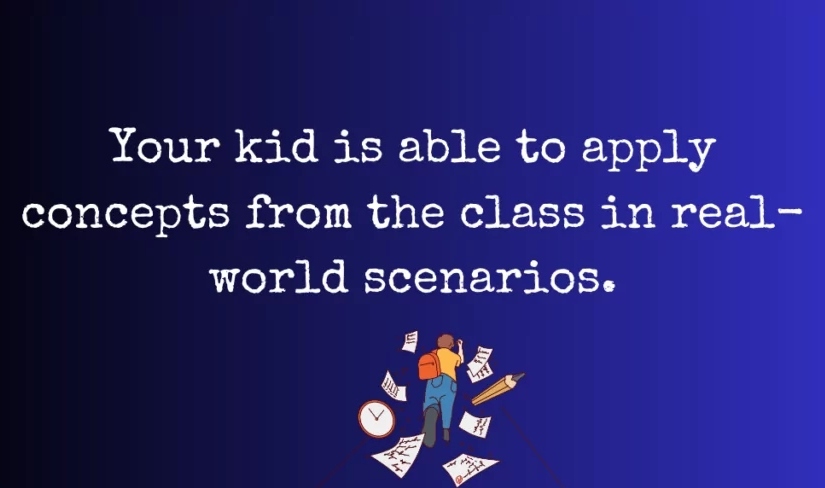
6 Outstanding Academic Achievement Comments
This is for students who have performed well academically. These comments assess a student’s progress and encourage future academic success.
1. ______ is an excellent student who always comes prepared for class. He is a joy to have in class and is always willing to help out other students.
2. _______ is a smart and inquisitive student who loves to learn. She is a pleasure to have in class and is always asking questions.
3. _______ is a hard-working student who is always trying his best. This year, he has made great progress, and I’m excited to see what he does next year.
4. _______ is a gifted student who excels in all her subjects. She has a bright future ahead of her, and I’m excited to see what she accomplishes.
5. _______ is a talented student who has a real passion for learning. He is always asking questions and is eager to get his hands on new material.
6. _______ is a well-rounded student who consistently performs at a high level. Their strong work ethic and positive attitude contribute to their success.
5 Partially Meeting Expectation Comments
This is for students who are partially meeting expectations academically.
1. _______ is an intelligent student who has great potential. He needs to work on staying focused in class and following directions.
2. _______ is a hard-working student who is making progress. She need to work on ___________ and ___________.
3. _______ has moments of greatness, but he needs to be more consistent with his effort and focus.
4. _______ is a bright student, but she needs to learn to apply herself more consistently.
5. _______ is a hard worker, but he needs to improve his organizational skills.
5 Social/Emotional Development
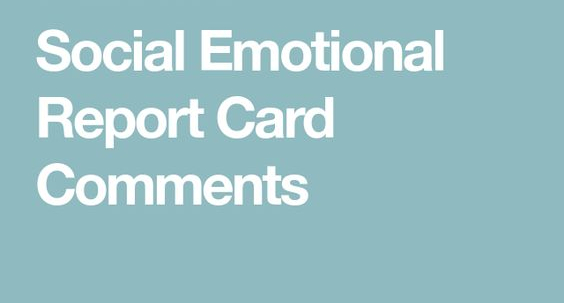
This is for students who are developing well socially and emotionally.
1. _______ is a kind and caring student who always looks out for others. He is a good friend to all and is always willing to help.
2. _______ has made great strides in his/her social development this year. She/he is more confident and able to express herself/himself well.
3. _______ works well with others and is able to take turns and share.
4. _______ is a leader among his/her peers and is often looked up to by other students.
5. _______ is an independent thinker who is not afraid to express his/her opinions.
Related Reading: Result-Driven Instructional Strategies for Teachers to Use
5 General Development
This is for students who are developing well academically, socially, and emotionally.
1. _______ has made great strides in his/her development this year. He is more confident and independent and is doing well academically.
2. _______ is a happy and thriving student who loves school. She is making friends and doing well academically.
3. _______ is a well-rounded student who is doing well in all areas. He is a good friend, does his best in school, and loves to learn.
4. _______ is a joy to have in class. She is polite, hard-working, and always has a smile on her face.
5. _______ is a model student who always puts his best foot forward. He is a role model to others and sets a good example for all to follow.
10 Communication Skills Report Card Comments
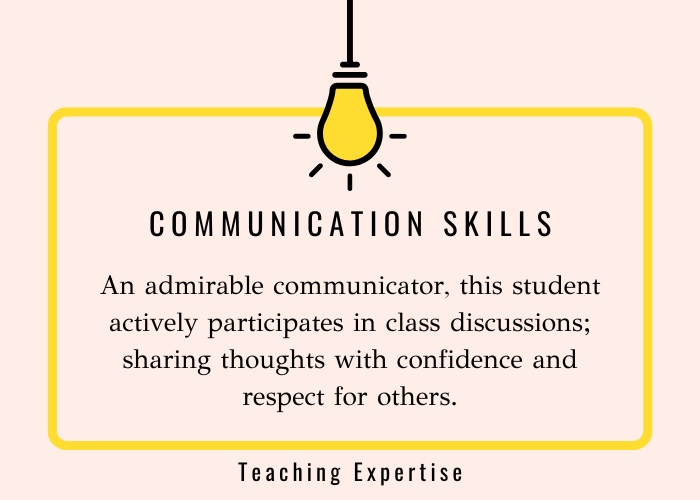
5 Positive Communication Skills Report Card Comments
1. ______ communicates their ideas effectively and listens attentively during class discussions.
2. ______ excels in expressing themselves clearly both verbally and through written work.
3. ______ demonstrates strong persuasion skills when presenting arguments or opinions in class.
4. ______ is respectful and thoughtful in their interactions, always ensuring to give others a chance to speak.
5. ______ uses polite and appropriate language in all forms of communication, setting a great example for peers.
5 Needs Improvement in Communication Skills Report Card Comments
1. ______ would benefit from participating more in class discussions to build their confidence in public speaking.
2. ______ needs to work on organizing their thoughts more clearly before speaking to improve clarity.
3. ______ should focus on listening more attentively to instructions and peers’ contributions during discussions.
4. ______ is encouraged to ask for clarification when they do not understand something, rather than remaining silent.
5. ______ could improve their ability to follow multi-step directions by repeating back what they need to do.
10 Classroom Behavior Report Card Comments
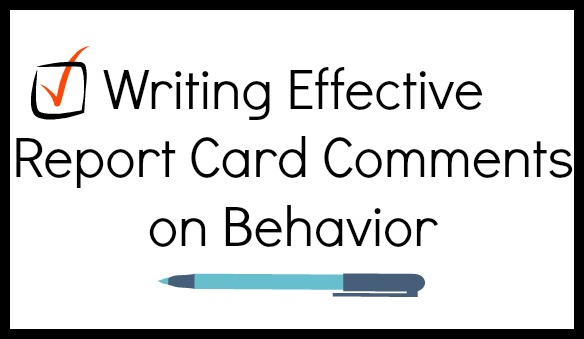
5 Positive Behavior Report Card Comments
1. ______ consistently demonstrates responsible behavior by following class rules and completing tasks on time.
2. ______ is a role model in the classroom, always behaving with integrity and respect towards others.
3. ______ listens attentively and actively participates in class discussions.
4. ______ maintains a positive attitude towards learning and is always eager to participate in school activities.
5. ______ shows great respect for school property and the belongings of others, always treating them with care.
5 Needs Improvement Behavior Report Card Comments
1. ______ occasionally disrupts class by talking out of turn, which can distract peers.
2. ______ needs to work on following directions the first time they are given.
3. ______ sometimes has difficulty controlling impulses, which leads to rushed decisions and actions.
4. ______ can improve in showing respect during class time by not interrupting others.
5. ______ would benefit from developing better strategies to manage frustration and stay calm under pressure.
20 Academic Level Report Card Comments
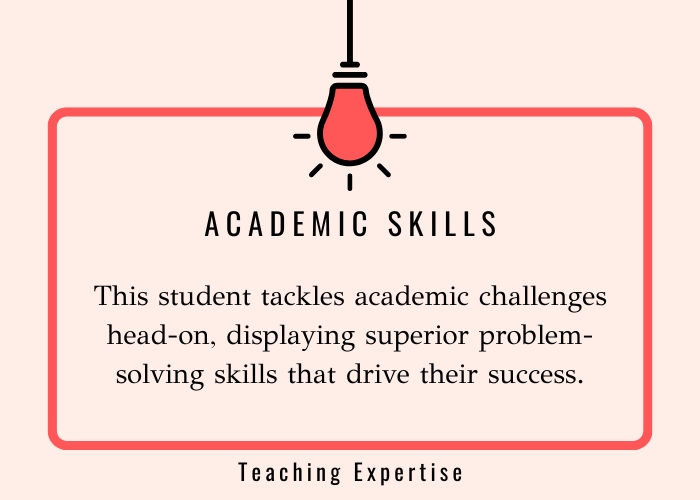
10 Language Arts Comments
5 Positive Report Card Comments for Language Arts
1. ______ has shown impressive progress in reading comprehension and can now summarize the key points of a story accurately.
2. ______ expresses their thoughts clearly and creatively in writing, showing a strong understanding of grammar and sentence structure.
3. ______ actively participates in class discussions and demonstrates a strong ability to use new vocabulary in context.
4. ______ has developed a genuine enthusiasm for reading, exploring a variety of genres and authors.
5. ______ consistently demonstrates excellent listening skills during story time and class instructions.
5 Improvement Report Card Comments for Language Arts
1. ______ would benefit from spending more time on spelling and phonics exercises to improve reading fluency.
2. ______ is encouraged to focus on developing clearer handwriting to enhance the legibility of their written work.
3. ______ needs to work on organizing their thoughts more coherently in writing, using paragraph breaks and transitional phrases.
4. ______ has a strong foundation in grammar. Focusing on sentence structure and vocabulary will further enhance their writing
5. ” ______ is advised to participate more actively in group discussions to boost their confidence in speaking.
10 Math Report Card Comments
5 Positive Math Report Card Comments
1. ______ has mastered the concepts taught this term and is able to solve complex math problems with accuracy.
2. ______ demonstrates a solid understanding of mathematical concepts and applies them effectively in problem-solving.
3. ______ is very methodical and thorough in their approach to solving math equations and rarely makes careless mistakes.
4. ______ shows excellent analytical skills, which helps them excel in math challenges and competitions.
5. ______ consistently completes math assignments on time and with a high degree of precision.
5 Needs Improvement Math Report Card Comments
1. ______ should practice multiplication and division facts to increase speed and confidence in problem-solving.
2. ______ needs to work on understanding and applying word problems more effectively by breaking down the problems into simpler steps.
3. ______ could improve in checking their work for errors before submitting assignments to avoid simple calculation mistakes.
4. ______ is encouraged to ask more questions in class when unsure of a concept, to avoid falling behind.
5. ______ would benefit from using visual aids and manipulatives to better understand complex math concepts.
5 Tips for Writing Effective Report Card Comments
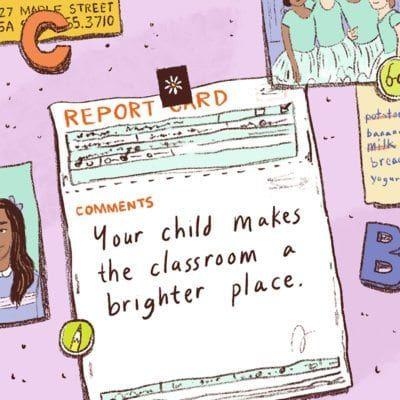
1. Use Specific, Concrete Examples
One of the most important things to do when writing report card comments is to use specific, concrete examples. This will help the student understand what they need to work on. For example, instead of saying, “______ needs to work on his behavior,” you could say, “_____ needs to work on staying seated during class.”
2. Avoid Generalities
When writing comments on a report card, it’s important to avoid generalities. For example, instead of writing “Your child is a joy to have in class,” try something more specific, such as “Your child is always willing to help out other students.” This will give the student and their family a better idea of what they’re doing well and what areas they can continue to improve in.
3. Use Positive Language
It’s essential to use positive language when writing report card comments. This means avoiding negative words like “doesn’t,” “won’t,” and “can’t.” For example, instead of writing “_____ doesn’t pay attention in class,” try “_____ is working on paying attention in class.” This small change can make a big difference in how students and their families perceive their progress.
4. Employ Sandwich Technique
The sandwich technique is a great way to deliver both positive and negative feedback in a report card comment. This means starting with a positive comment, followed by constructive criticism, and ending with another positive comment. This gives the student a sense of their progress while still providing areas for improvement.
5. Proofread Your Comments
When writing report card comments, it’s important to be clear and accurate. However, it’s also important to make sure that your comments are free of typos and grammatical errors. After all, you don’t want to give a student or their family the wrong impression about their academic progress! Make sure to proofread your comments before sending them home.
Now that we’ve gone over some tips for writing effective report card comments let’s take a look at some examples.
Related Reading: How to Create a Teaching Plan in Easy Steps
Let’s Grade!
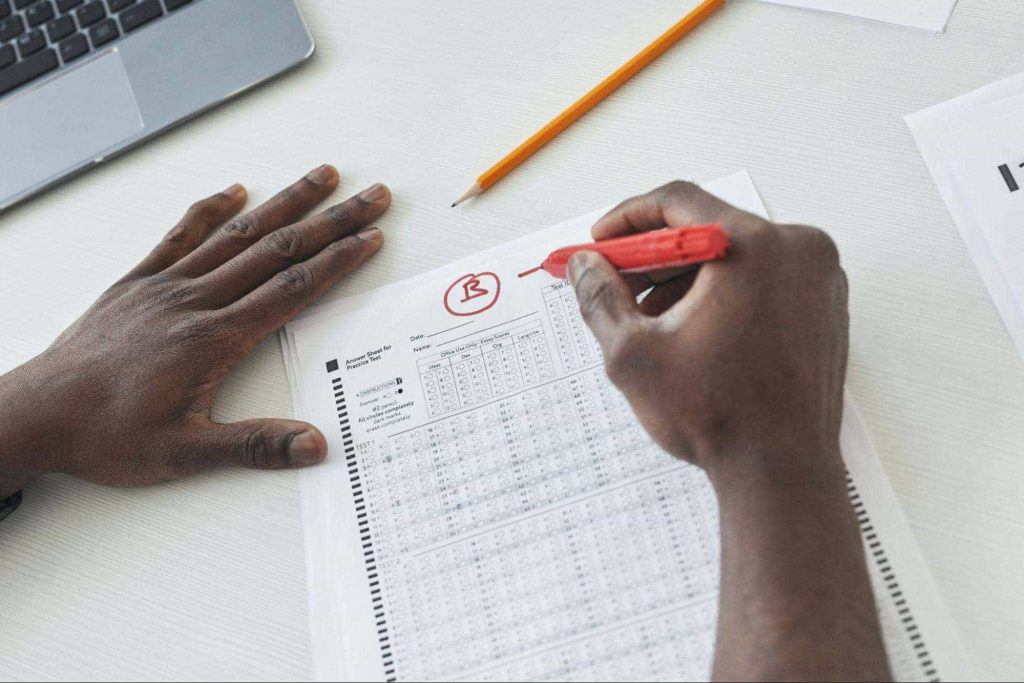
Now that we have gone over some tips for writing effective report card comments and examples of what to write, it’s time to get started on those report cards! We hope this guide has been helpful and wish you the best of luck in the new school year.
Related Reading: Best Classroom Reward Ideas for Elementary Students
Frequently Asked Questions (FAQs)
What should I do if I’m having trouble coming up with something to write?
If you’re struggling to come up with something to write, try focusing on the positive. Instead of starting with what the student needs to work on, start with what the student is doing well. This will help you brainstorm some ideas of things to say. You can also ask other teachers or the student’s parents for input.
Can I use report card comments from other sources?
While you can use comments from other sources as inspiration, you must take the time to personalize each comment. This way, the student and their family will know that you took the time to write something specifically for them.
What if I need to give a student negative feedback?
If you need to give a student negative feedback, it’s essential to be clear, concise, and constructive. For example, instead of writing “________ is lazy and doesn’t do his work,” try “________ needs to work on being more diligent with his schoolwork.” It’s also important to balance any negative comments with positive ones. This way, the student and their family will know that you still see potential and are invested in their success.
Do I need to write a comment for every subject?
While you don’t need to write a comment for every subject, it’s generally a good idea to do so. This way, the student and their family will have a complete picture of their progress. If you’re short on time, try focusing on the subjects that the student is struggling in or that you feel are most important.
What is the best way to end a report card comment?
The best way to end a report card comment is with a statement of hope or encouragement. For example, you could write, “I’m looking forward to seeing ________ progress in the second half of the year” or “I know that ________ can reach his/her goals if he/she continues to work hard.”

















